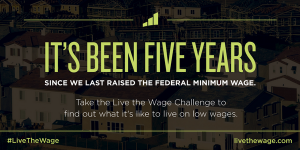
Professor Epstein Wants People to Take Jobs at 2 Cents an Hour
There is a growing support for raising the minimum wage. In fact, 22 states and the District of Columbia have already enacted increasesabove the federal $7.25 per hour. But that view is not shared by Richard Epstein, professor of law at NYU. He was on the PBS NewsHour on July 28. Here’s his exchange with reporter Paul Solman:
RICHARD EPSTEIN: “I want people to be able to take jobs at 2 cents an hour if that is what it takes so that a year from now they can take $12 an hour.”
PAUL SOLMAN: And if people are earning 2 cents an hour, how are they supposed to survive?
RICHARD EPSTEIN: Obviously, at some particular point, they are going to have to have two jobs.
PAUL SOLMAN: Or, at 2 cents an hour, several hundred. But isn’t that, well, absurd?
RICHARD EPSTEIN: No, it’s not. You assume that the only return that a worker gets from a job is the wage consideration. That’s just wrong. It is a whole variety of social skills that you acquire. Recommendations, connections, and network really matter.
So let’s set the record straight. Yes, it is absurd. He’s mixing up the unpaid work that privileged people do with low-wage work that some have no choice but to do if they want to live. The fact is, at the low-end side of wages, workers who stay in the labor force do see an increase in their earnings over time, but their earnings are still very low. A study that tracked earnings of low-wage workers from 1995 to 2001 found that whites moved from just under $5,000 a year to a little over $9,000 a year. Non-whites’ earnings rose from about $3,000 to about $5,600. Those who are able to work full-time consistently over five or six years may be able to get out of poverty, but low-wage jobs often do not allow consistent full-time hours, so even with wage gains over time, the worker will still be poor or the nearest thing to it.
That’s an argument for raising the minimum wage. Workers will work as much as they can. Employers will mostly pay as little as they can, by limiting workers to unstable hours and/or low hourly pay. If Professor Epstein had his way, they’d be paying a lot less. Employers are already taking in record profits. If they can pay less, they’ll rake in more, drastically widening inequality and drastically reducing workers’ living standards. And the unfettered labor market will not result in moving workers to a living wage. That’s not just a theory – in the real world, as The New York Times reported last April, “Corporate profits are at their highest level in at least 85 years. Employee compensation is at the lowest level in 65 years.”
Okay – Professor Epstein is on the libertarian fringe. But the view that there shouldn’t be any minimum wage at all has its adherents in Congress these days. Senator Marco Rubio (R-FL) has said “I don’t think a minimum wage law works.” Speaker Boehner (R-OH) said “When you raise the price of employment, guess what happens? You get less of it.” Rand Paul (R-KY) and Lamar Alexander (R-TN) have similar views, to name a few.
They are head-smackingly wrong. Real-world evidence, comparing places that have raised the minimum wage to those that haven’t, compiled over decades, shows that there is little or no job loss associated with raising the minimum wage.
So here’s what we know: Speaker Boehner and a hard-right cadre don’t care how low the minimum wage gets. But the facts demonstrate (1) wages don’t rise to a living level just because people are slogging it out in the low-wage market; (2) over years when the minimum wage (and higher wages) have stagnated, productivity gains are not shared by workers; virtually all the gains have been snagged by corporations and high-income individuals; and (3) raising the minimum wage won’t decrease jobs.
And here’s one more thing I’ve been learning this past week: You can’t  live a healthy life on the minimum wage. I’ve been trying, and mostly failing, to take the LiveTheWage challenge. The premise is that after subtracting typical rent and tax payments, the full-time minimum wage worker has $11 a day, or $77 a week to pay for everything else. Where I live, it costs $7 a day to get to work and back on the Metro. So that leaves $4 a day. The first day, I kind of did it, at least if you wanted to pretend that I could blow my whole wad on food and not worry about having any other bills. I ate some cheese and crackers for lunch and shared pasta and sausage with my family for dinner. The second day, I had to go to the dentist to fix broken fillings. Adding in the extra transportation to get to the dentist put me over what I theoretically had to spend. Just getting there – not the cost of the dental work. Of course, if I were a minimum wage worker, the odds are overwhelming that I would not have dental insurance or any way to pay a dentist. So I wouldn’t have been splurging on transportation to see one. Quite a savings, at least until more pain or infection set in.
live a healthy life on the minimum wage. I’ve been trying, and mostly failing, to take the LiveTheWage challenge. The premise is that after subtracting typical rent and tax payments, the full-time minimum wage worker has $11 a day, or $77 a week to pay for everything else. Where I live, it costs $7 a day to get to work and back on the Metro. So that leaves $4 a day. The first day, I kind of did it, at least if you wanted to pretend that I could blow my whole wad on food and not worry about having any other bills. I ate some cheese and crackers for lunch and shared pasta and sausage with my family for dinner. The second day, I had to go to the dentist to fix broken fillings. Adding in the extra transportation to get to the dentist put me over what I theoretically had to spend. Just getting there – not the cost of the dental work. Of course, if I were a minimum wage worker, the odds are overwhelming that I would not have dental insurance or any way to pay a dentist. So I wouldn’t have been splurging on transportation to see one. Quite a savings, at least until more pain or infection set in.
So I got a tiny taste of living on impossibly low wages. As the days went on, I kept eating slices of cheese and crackers. I wasn’t making my family eat a minimum-wage dinner; even splitting out the cost of my part, those dinners would have put me over the $4 I was allowed for food. An affordable meal would have been high starch and low protein, or a cheap can of soup. Over the weekend, I had to put gas in our car. Well – the minimum wage does not pay for much gas, even though I saved the $7 round trip to work on the weekend days. If the car needed repairs? I’d be in trouble.
Leaving workers without the ability to pay for the dentist or doctor, or even for aspirins; having to choose between eating something healthy and filling your gas tank – this is not just unjust. It makes people and families vulnerable to crisis. A small sickness can turn into a long-term disability. A car breakdown can force you right out of a job. We need everybody to be able to participate in our economy, buying what they need and working to provide the services and products other people need. Today’s minimum wage won’t allow that. Justice – and the facts – demand a raise.


The views and opinions expressed in this post are those of the author(s) and do not necessarily reflect those of MomsRising.org.
MomsRising.org strongly encourages our readers to post comments in response to blog posts. We value diversity of opinions and perspectives. Our goals for this space are to be educational, thought-provoking, and respectful. So we actively moderate comments and we reserve the right to edit or remove comments that undermine these goals. Thanks!